Director Věra Chytilova is one of the representatives of the Czechoslovak New Wave film period, known as "the most avant-garde female director in Eastern Europe" and "the first lady of Czech cinema". I personally don't like people putting "female" in front of a female director because you don't put "male" in front of a male director. So, I simply think she's a very avant-garde, very stylized director, and I really like her work.
"Daisy", this 1966 work, after 55 years, is still an avant-garde work in my heart.
The avant-garde of this work is first and foremost reflected in the audio-visual impact it gives you . It took nearly 2 minutes to open the film, using repetitive montages, in the tense music like war drums, cross-showing the destruction of the world by artillery shells in the war. Do you think this is a war movie? Then the picture suddenly turns to a conversation between two girls, who think that no one in the world understands them, that everything in the world has fallen, and they decide to start falling too . This is how the story begins, they go out on dates with different old men, or go to the dance hall to make trouble, or steal and spoil the rich food.
I am a person who likes to express the atmosphere of a film through different tones. In this work, you can see that almost all the colors are presented in the film, sometimes black and white, sometimes red, sometimes amber, sometimes in a scene, each screen switches different colors, Sometimes switching between different colors in one shot , I'd say, it's awesome too, I love it. Every time I want to show it in my work, I feel like a genius, and then I see these expressions, and I feel ashamed when someone did it a long time ago.
The character performance of this work is deliberate and contrived , but this deliberate and contrived is just right . Sometimes they wear beautiful dresses, sometimes they wear clothes made of newspapers like astronauts, sometimes they wear bikinis, sometimes they fight, sometimes they meditate, sometimes they laugh, sometimes they do weird things, cut eggs with scissors, set fire to the house Burning things and watching them is like leaving the earth and going to another planet.
Under the core of the seemingly "degenerate" story of the two girls, the film inserts images of war elements into it. In addition to the opening two minutes, the ending also ends with a long, aerial view of the devastation brought about by the war. Even after the black screen, the sound of cannons is still deafening, beating the heart. The story of these two girls is wrapped in the war, just like the war wraps people's lives. A subtitle appears at the end of the film, " This film is dedicated to those whose spiritual life is in chaos. " In the context of the era of war and post-war reconstruction, "chaos" is a reflection of people's lives. And that may be what the director wanted to express. In an interview with the documentary " Icentahedron of Czechoslovakian New Wave Cinema in the 1960s" , the director said that " we know that films should express things that cannot be expressed in other languages" . I think everyone has their own understanding of this sentence.
View more about Daisies reviews







